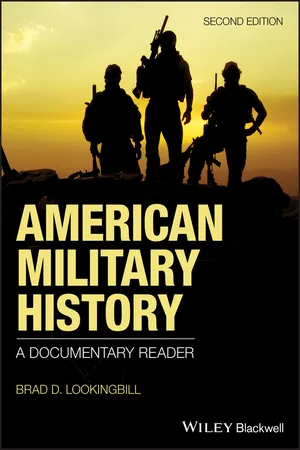
American Military History
A Documentary Reader
Brad D. Lookingbill
- English
- ePUB (handyfreundlich)
- Über iOS und Android verfügbar
American Military History
A Documentary Reader
Brad D. Lookingbill
Über dieses Buch
A collection of primary documents that explore the many facets of the American military from the colonial period to the present
The second edition of American Military History offers an exceptional collection of primary documents relating to history of the military of the United States from 1607 through the present. The writings offer insight into the armed forces in relation to the social, cultural, economic, political, and territorial development of the United States. Several documents comment on strategic initiatives, combat operations, force structure, public policy, and home fronts. The writings also present firsthand testimony of extraordinary men and women in uniform and most of the documents explore the connections between combatants and the societies that produced them.
From the beginnings of the war against the natives through the tragedy of the Civil War and up to the current Global War on Terror, American Military History offers a chronological account of the evolution of the United States military. This vital text:
- Includes writings that explore the diversity of the armed forces
- Explores leadership in America's military affairs
- Traces America's ways of war beginning in 1607 through the present
- Examines the patterns of design and purpose of the American military over time
- Reveals the vitality of civil-military relations in the United States
Written for academics and students of military history, American Military History is an important text that draws on primary sources to explore the many facets of America's military history.
Häufig gestellte Fragen
Information
1
An Uncommon Defense
Chronology
| 1492 | Europeans invade the Americas |
| 1565 | The Spanish establish Saint Augustine |
| 1607 | The English establish Jamestown |
| 1608 | The French found Quebec |
| 1609–1613 | First Anglo‐Powhatan War in Virginia |
| 1614 | The Dutch erect Fort Nassau |
| 1620 | The Pilgrims settle Plymouth |
| 1636–1637 | The Pequot War in New England |
| 1644–1646 | Second Anglo‐Powhatan War in Virginia |
| 1675–1676 | King Philip’s War in New England |
| Bacon’s Rebellion in Virginia | |
| 1698 | King William’s War |
| 1702–1712 | Queen Anne’s War |
| 1715–1716 | Yamasee War in South Carolina |
| 1739–1748 | King George’s War (War of Jenkins’ Ear) |
| 1754–1763 | Great War for Empire (French and Indian War) |
| 1770 | Boston Massacre |
| 1774 | Parliament Adopts the Coercive Acts |
1.1 Powhatan Describes War among the Natives (1607)
Document
Questions for Consideration
- What, according to Powhatan, were the essential differences between “peace and warre” under his rule?
- Why did he dread fighting against the English in particular?
- How did he propose to prevent more fighting in the future?